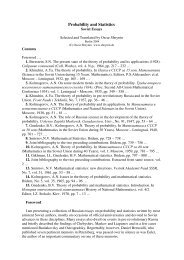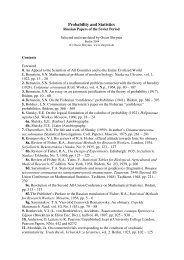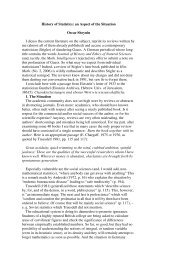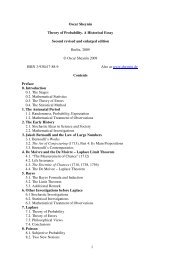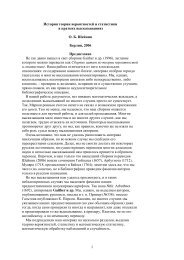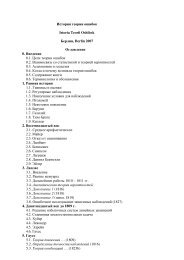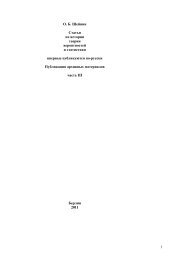Conclusion. Some Problems<strong>of</strong> <strong>the</strong> Current Development <strong>of</strong> <strong>the</strong> Theory <strong>of</strong> <strong>Probability</strong>The examples provided <strong>in</strong> Chapter 2 were aimed at illustrat<strong>in</strong>g <strong>the</strong>idea that <strong>the</strong> problem concern<strong>in</strong>g <strong>the</strong> boundaries <strong>of</strong> applicability <strong>of</strong> <strong>the</strong><strong>the</strong>ory <strong>of</strong> probability can not be solved speculatively, by logicaljustification (or by justify<strong>in</strong>g <strong>the</strong> opposite). Nei<strong>the</strong>r does a s<strong>in</strong>glepractical success scientifically assure us <strong>in</strong> <strong>the</strong> correctness <strong>of</strong> a<strong>the</strong>oretical concept. [...]Only prolonged studies last<strong>in</strong>g many years (almost 20 years <strong>in</strong> <strong>the</strong>Fram<strong>in</strong>gham <strong>in</strong>vestigation (§ 2.2)) <strong>and</strong> even carried out by manygenerations <strong>of</strong> scientists (like <strong>the</strong> study <strong>of</strong> problems <strong>of</strong> heredityorig<strong>in</strong>ated by Mendel) provide a reliable result. In a purely methodicalsense such studies ensure complete possibility <strong>of</strong> experimental checks<strong>of</strong> many stochastic assumptions. In particular, checks <strong>of</strong> statisticalhomogeneity (for example, by non-parametric criteria fordist<strong>in</strong>guish<strong>in</strong>g two empirical distribution functions), <strong>of</strong> confidence<strong>in</strong>tervals (recall my rejection <strong>of</strong> that <strong>in</strong>terval for <strong>the</strong> mass <strong>of</strong> Jupiter <strong>in</strong>§ 1.1) <strong>and</strong> <strong>of</strong> much more.And so, it is wrong that no experimental checks are threaten<strong>in</strong>gthose premises (Alimov’s objection). However, if simply collect<strong>in</strong>g <strong>the</strong>(statistical or not) ensemble <strong>of</strong> all <strong>the</strong> <strong>in</strong>stances <strong>in</strong> which stochasticmethods are applied, <strong>and</strong> f<strong>in</strong>d out <strong>in</strong> how many cases Alimov <strong>and</strong> Iwere <strong>in</strong> <strong>the</strong> right, <strong>the</strong>n, as I fear, he would have collected anoverwhelm<strong>in</strong>g majority <strong>of</strong> votes. I would have to take cover beh<strong>in</strong>d <strong>the</strong>argument that <strong>in</strong> science a numerical majority <strong>of</strong> votes might meannoth<strong>in</strong>g.All <strong>the</strong> circumstances concern one aspect <strong>of</strong> <strong>the</strong> problem, <strong>of</strong> what<strong>and</strong> under which conditions can <strong>the</strong>ory give to practice. Let us try toth<strong>in</strong>k what, on <strong>the</strong> contrary, can practice give to <strong>the</strong>ory. Forma<strong>the</strong>matics, this is a venerable question <strong>and</strong> most extremely pert<strong>in</strong>entop<strong>in</strong>ions had been voiced. I beg<strong>in</strong> by quot<strong>in</strong>g <strong>the</strong> op<strong>in</strong>ion <strong>of</strong> <strong>the</strong>celebrated French ma<strong>the</strong>matician Dieudonne (1966, p. 11; translatednow from Russian):In conclud<strong>in</strong>g, I would wish to stress how little does <strong>the</strong> most recenthistory exonerate <strong>the</strong> pious banalities <strong>of</strong> <strong>the</strong> soothsayers <strong>of</strong> a break-upwho are regularly warn<strong>in</strong>g us about <strong>the</strong> pernicious consequences thatma<strong>the</strong>matics will unavoidably attract to itself by ab<strong>and</strong>on<strong>in</strong>gapplications to o<strong>the</strong>r sciences. I do not wish to say that a close contactwith o<strong>the</strong>r fields such as <strong>the</strong>oretical physics is not beneficial for bothsides. It is absolutely clear, however, that among all <strong>the</strong> astonish<strong>in</strong>gachievements described, not a s<strong>in</strong>gle one, possibly except<strong>in</strong>g <strong>the</strong><strong>the</strong>ory <strong>of</strong> distributions, is at all suitable for be<strong>in</strong>g applied <strong>in</strong> physics.Even <strong>in</strong> <strong>the</strong> <strong>the</strong>ory <strong>of</strong> partial differential equations <strong>the</strong> emphasis is nowmuch more on <strong>the</strong> <strong>in</strong>ternal <strong>and</strong> structural problems than on thosehav<strong>in</strong>g a direct physical significance.Even if ma<strong>the</strong>matics be cut <strong>of</strong>f forcibly from all <strong>the</strong> o<strong>the</strong>r streams <strong>of</strong>human activity, it will still have food enough for centuries <strong>of</strong> thoughtabout great problems which we still ought to solve <strong>in</strong> our own science.116
What objections can be made? First, s<strong>in</strong>ce <strong>the</strong> problem concerns an<strong>in</strong>terval <strong>of</strong> a few centuries <strong>of</strong> time, it will be advisable to turn tohistory <strong>and</strong> look whe<strong>the</strong>r <strong>the</strong>re are examples <strong>of</strong> what is happen<strong>in</strong>g withsome fields <strong>of</strong> <strong>in</strong>tellectual activity <strong>the</strong> <strong>in</strong>terest <strong>in</strong> which is preserved aslong as that. An example <strong>of</strong> such an activity is <strong>the</strong> scholasticism <strong>of</strong> <strong>the</strong>Middle Ages.Scholastics were clever <strong>and</strong> diligent. In any case, <strong>the</strong> volume <strong>of</strong><strong>the</strong>ir contributions was <strong>of</strong> <strong>the</strong> same order as, say, those <strong>of</strong> Laplace (<strong>the</strong>amount <strong>of</strong> paper that a man can cover with writ<strong>in</strong>g dur<strong>in</strong>g his lifetimelikely little depends on <strong>the</strong> contents <strong>of</strong> <strong>the</strong> written). Universities <strong>and</strong>academies had been <strong>in</strong>itially created for scholastics because <strong>of</strong> <strong>the</strong>importance <strong>of</strong> <strong>the</strong> moral <strong>and</strong> ethical applications <strong>of</strong> <strong>the</strong>ir work, actualor imag<strong>in</strong>ed. No one had expelled <strong>the</strong>m from those <strong>in</strong>stitutions with ared-hot broom 25 , but it somehow happened all by itself that scientists,physicists, ma<strong>the</strong>maticians, chemists etc., had occupied <strong>the</strong>ir places.Why did that occur?I believe that <strong>the</strong> reason was that scholasticism had graduallywithdrawn <strong>in</strong>to its own bus<strong>in</strong>ess <strong>and</strong> quit to provide society solutions<strong>of</strong> moral problems essential for everyday life. For example, now, as <strong>in</strong><strong>the</strong> Middle Ages, each solves for himself whe<strong>the</strong>r to marry or not.Scholastics naturally discussed that problem but <strong>the</strong>ir answers becamelong summaries <strong>of</strong> <strong>the</strong> diverse op<strong>in</strong>ions <strong>of</strong> fa<strong>the</strong>rs <strong>of</strong> <strong>the</strong> church <strong>and</strong>ancient philosophers 26 . What <strong>the</strong>n should have done a practicallywork<strong>in</strong>g clergyman when asked by his parishioner?Such questions gradually occurred unbecom<strong>in</strong>g to serious science<strong>and</strong> <strong>the</strong>n it somehow happened all by itself that <strong>the</strong> society had begunto consider unbecom<strong>in</strong>g scholasticism as a whole. This examplecompels us to th<strong>in</strong>k carefully what would have happened toma<strong>the</strong>matics had it been for centuries cut <strong>of</strong>f from all <strong>the</strong> streams <strong>of</strong>activities. The action <strong>of</strong> <strong>the</strong> ensu<strong>in</strong>g phenomenon would have beenvery simple: <strong>the</strong> number <strong>of</strong> young men wish<strong>in</strong>g to devote <strong>the</strong>mselvesto ma<strong>the</strong>matics would have gradually decreased s<strong>in</strong>ce those o<strong>the</strong>rstreams <strong>in</strong>deed play <strong>the</strong> most important part <strong>in</strong> attract<strong>in</strong>g <strong>the</strong>ir <strong>in</strong>terest.However, f<strong>in</strong>ally it is possible to admit, <strong>and</strong> Dieudonne’s articleconv<strong>in</strong>ces us, that <strong>the</strong>re exists ma<strong>the</strong>matics <strong>of</strong> different types; one isdirected towards its own <strong>in</strong>terests, <strong>the</strong> o<strong>the</strong>r one, towards applications.Both have a quite lawful right to exist because, for example, <strong>the</strong>Kolmogorov axiomatics <strong>of</strong> <strong>the</strong> <strong>the</strong>ory <strong>of</strong> probability, necessary <strong>in</strong> asense for applications as well, had emerged on <strong>the</strong> basis <strong>of</strong> <strong>the</strong> <strong>the</strong>ory<strong>of</strong> functions <strong>of</strong> a real variable (obviously belong<strong>in</strong>g to <strong>the</strong> first type).But <strong>the</strong>n, to which type does <strong>the</strong> <strong>the</strong>ory <strong>of</strong> probability belong?The dist<strong>in</strong>guish<strong>in</strong>g feature <strong>of</strong> ma<strong>the</strong>matics <strong>of</strong> <strong>the</strong> first type is itssomewhat special elegance (present<strong>in</strong>g a comparative simplicity whichmakes it possible to perceive that quality). The <strong>the</strong>ory <strong>of</strong> probabilityhas ra<strong>the</strong>r many results <strong>of</strong> exactly that k<strong>in</strong>d, mostly connected with <strong>the</strong>Kolmogorov axiomatics <strong>and</strong> resembl<strong>in</strong>g <strong>the</strong> <strong>the</strong>ory <strong>of</strong> functions <strong>of</strong> areal variable. However, <strong>the</strong> ma<strong>in</strong> contents <strong>of</strong> that science hav<strong>in</strong>g beenformed at <strong>the</strong> time <strong>of</strong> Laplace 27 , develop<strong>in</strong>g after him <strong>and</strong> be<strong>in</strong>gelaborated nowadays is not, alas! beautiful at all. For example, limit<strong>the</strong>orems are usually ra<strong>the</strong>r decently formulated, but as a rule <strong>the</strong>irpro<strong>of</strong>s are helplessly long, difficult <strong>and</strong> entangled. Their sole raison117
- Page 1 and 2:
Studies in the History of Statistic
- Page 3 and 4:
Introduction by CompilerI am presen
- Page 5 and 6:
(Lect. Notes Math., No. 1021, 1983,
- Page 7 and 8:
sufficiently securely that a carefu
- Page 9 and 10:
is energy?) from chapter 4 of Feynm
- Page 11 and 12:
demand to apply transfinite numbers
- Page 13 and 14:
for stating that Ω consists of ele
- Page 15 and 16:
chances to draw a more suitable apa
- Page 17 and 18:
Let the space of elementary events
- Page 19 and 20:
2.3. Independence. When desiring to
- Page 21 and 22:
Eξ = ∑ aipi.Our form of definiti
- Page 23 and 24:
absolutely precisely if the pertine
- Page 25 and 26:
where x is any real number. If dens
- Page 27 and 28:
probability can be coupled with an
- Page 29 and 30:
Nowadays we are sure that no indepe
- Page 31 and 32:
λ = λ(T)with λ(T) being actually
- Page 33 and 34:
(1/B n )(m − A n )instead of the
- Page 35 and 36:
along with ξ. For example, if ξ i
- Page 37 and 38:
µ( − p0) ÷np0 (1 − p0)nhas an
- Page 39 and 40:
distribution of the maximal term |s
- Page 41 and 42:
ξ (ω) + ... + ξ (ω)n1n{ω :|
- Page 43 and 44:
P{max ξ(t) ≥ x} = 0.01, 0 ≤ t
- Page 45 and 46:
1. This example and considerations
- Page 47 and 48:
IIV. N. TutubalinTreatment of Obser
- Page 49 and 50:
structure of statistical methods, d
- Page 51 and 52:
Suppose that we have adopted the pa
- Page 53 and 54:
and the variances are inversely pro
- Page 55 and 56:
It is interesting therefore to see
- Page 57 and 58:
is applied with P(t) being a polyno
- Page 59 and 60:
ut some mathematical tricks describ
- Page 61 and 62:
It is clear therefore that no speci
- Page 63 and 64:
of various groups of machines, and
- Page 65 and 66: nnA(λ) x sin λ t, B(λ) = x cosλ
- Page 67 and 68: of the mathematical model of the Br
- Page 69 and 70: dF(λ) = f (λ) dλ, so that B( t
- Page 71 and 72: usually very little of them. Indeed
- Page 73 and 74: This is the celebrated model of aut
- Page 75 and 76: applications of the theory of stoch
- Page 77 and 78: achieved by differentiating because
- Page 79 and 80: u(x 1 , x 2 , t 1 , t 2 ) = v(x 1 ,
- Page 81 and 82: Reasoning based on common sense and
- Page 83 and 84: answering that question is extremel
- Page 85 and 86: IIIV. N. TutubalinThe Boundaries of
- Page 87 and 88: periodograms. It occurred that work
- Page 89 and 90: at point x = 1. However, preceding
- Page 91 and 92: He concludes that since the action
- Page 93 and 94: The verification of the truth of a
- Page 95 and 96: In the purely scientific sense this
- Page 97 and 98: ought to learn at once the simple t
- Page 99 and 100: the material world science had inde
- Page 101 and 102: values of (2.1) realized in the n e
- Page 103 and 104: *several dozen. The totality µ ica
- Page 105 and 106: Mendelian laws. It is not sufficien
- Page 107 and 108: example, the problem of the objecti
- Page 109 and 110: a linear function is not restricted
- Page 111 and 112: 258 - 82 - 176 cases or 68.5% of al
- Page 113 and 114: The Framingham investigation indeed
- Page 115: or, for discrete observations,IT(ω
- Page 119 and 120: eliability and queuing are known to
- Page 121 and 122: Kolman E. (1939 Russian), Perversio
- Page 123 and 124: measurement is provided. Recently,
- Page 125 and 126: which means that sooner or later th
- Page 127 and 128: The foundations of the Mises approa
- Page 129 and 130: A rather subtle arsenal is develope
- Page 131 and 132: 4.3. General remarks on §§ 4.1 an
- Page 133 and 134: BibliographyAlimov Yu. I. (1976, 19
- Page 135 and 136: processes are now going on in the s
- Page 137 and 138: obtaining a deviation from the theo
- Page 139 and 140: VIOscar SheyninOn the Bernoulli Law



